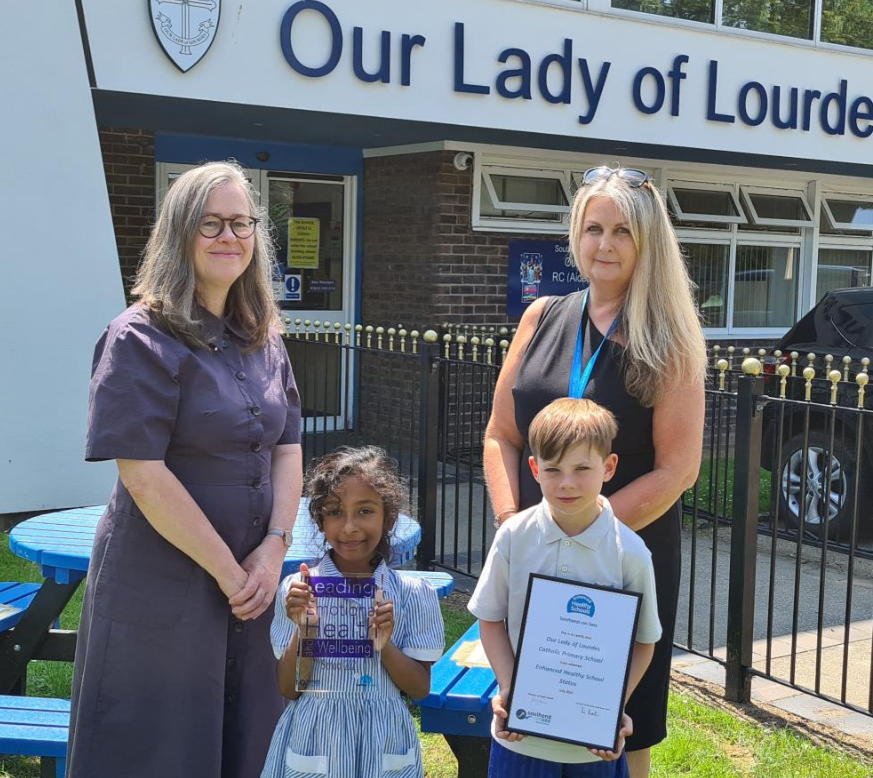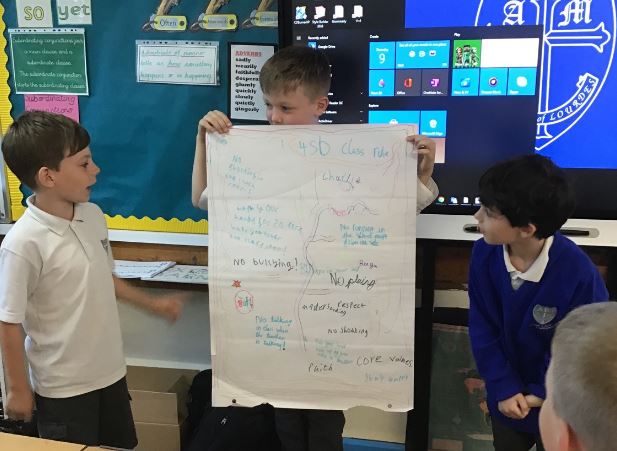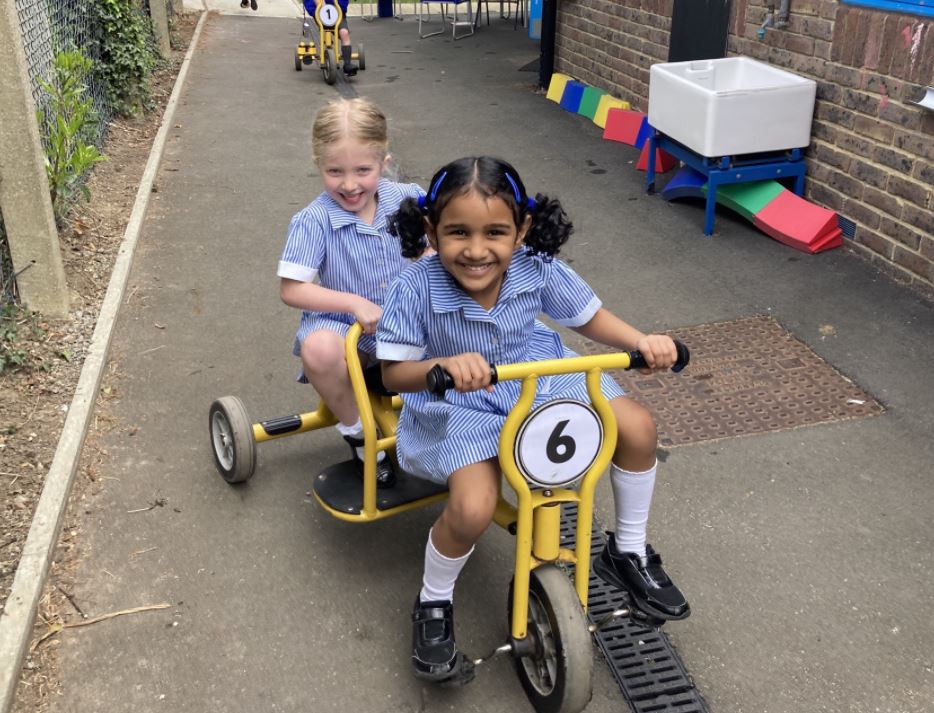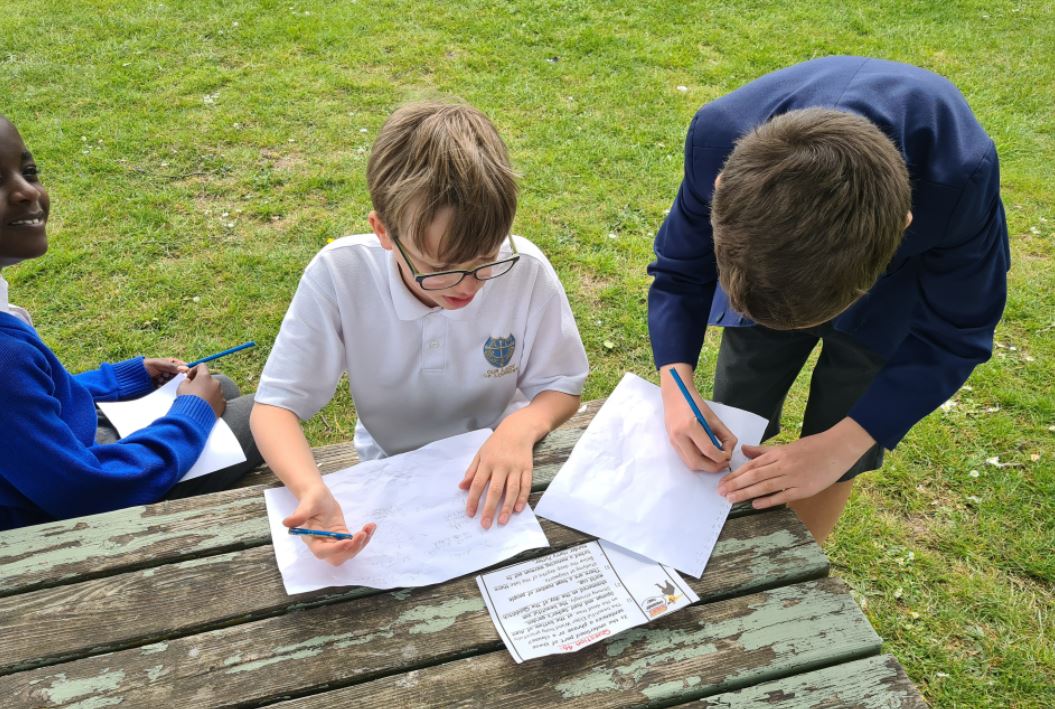PSHE
It is our intent that our PSHE Education programme, enables our children to become happy, healthy, independent and responsible members of society. We want our children to have high aspirations and a belief in themselves that anything is possible if they put their mind to it. When OLOL children leave year 6, we want them to continue to develop their high levels of resilience so that they have the skills to manage times when life will be hard, so that they succeed and have courage when faced with the challenges that life will throw at them. They will recognise that we all have great strengths but that is balanced with areas that will challenge us, areas that we will have to work harder in.
Please click here for information about our RSE curriculum.
We want our children to
- have the skills and knowledge to deal with an ever-changing, diverse world and be global citizens who behave morally, socially, responsibly, culturally and respectfully; knowing that the actions/choices they make impact on the wider community.
- understand how a society works and what it is to belong to one, including rights, rules, laws and citizenship. They will appreciate difference and diversity. They will recognise and apply the British values of democracy, tolerance, mutual respect, rule of law and liberty.
- know about finances and how to best manage their money.
- Identify their strengths and understand how important it is to choose a career that best suits their skills and talents, knowing that in contributing to our school, local communities and the wider world, they receive so much more.
In conjunction with our RSE, RE, Science and P.E. programmes, children at OLOL will understand:
- the importance of looking after their physical health, to understand how to keep healthy and to understand that this links directly with our mental health and well-being.
- the importance of having good mental health; to understand what it is and how to look after it. What it means to be happy and to identify ways to do this - bespoke to them. To identify both positive and negative feelings and to understand that these are part of life; to manage their emotions responsibly and effectively; to have a toolkit of resources, including their faith, to support them and, most importantly, to identify when and who to ask for help
Through our PSHE, RSE, Science and our RE programmes, it is our intention that children develop spiritually and morally, that they have self-respect and self-worth. That they learn to understand and manage the many relationships they will have throughout their lives.
- Children will understand the physical aspects involved in RSE at an age appropriate level, have respect for themselves and others and have a positive self-esteem.
Children will have an understanding of drugs and alcohol and leave the school equipped with the skills to keep themselves safe and manage risks effectively.

We are very proud to have achieved Enhanced Healthy School Status.
Over the course of our children's learning in PSHE, they revisit the following key areas:
| Keeping Myself Safe | Making and Maintaining Healthy Relationships | Health and Wellbeing | Living in the Wider World |
|---|---|---|---|
| This concept involves knowing the importance of and how to stay safe both online and with personal safety. It includes understanding who to talk to and when.Investigate places and their features (NC 3.1, 3.2). |
This concept is about understanding how to be a friend and what skills and qualities friends need to have and demonstrate over time. It involves understanding what a healthy relationship is and how to respond and protect yourself and others when a relationship is healthy. It is also about having a healthy relationship with yourself (NC 3.1, 3.2). |
This concept is about understanding and maintaining good physical and mental health. It includes understanding the positive impact of physical and wellbeing activities have on the body and mind (NC 3.1, 3.2). |
To learn to be tolerant and show acceptance towards others. To understand the importance of living in an inclusive society and the responsible role we all play within it. To know how to show good citizenship towards others (NC 3.1, 3.2). |
Please click below to see the learning areas in each year group.
Eyfs - Reception
In the Early Years Foundation Stage, PSHE is referred to as personal, social and emotional development. This area of children’s learning is concerned with wellbeing – knowing who you are, where you fit in and feeling good about yourself. It is also about developing respect for others, social competence and a positive disposition to learn.
Personal, Social and Emotional Development (PSED) is one of three prime areas of learning in the EYFS Curriculum Framework. It involves helping children to develop a positive sense of themselves, and others; to form positive relationships and develop respect for others; to develop social skills and learn how to manage their feelings; to understand appropriate behaviour in groups; and to have confidence in their own abilities. At OLOL, PSED is part of our everyday activities where we encourage children to talk about their feelings, take responsibility for their behaviour, build lasting relationships with adults and children and instil self confidence in our pupils. Circle times are completed regularly to support PSHE and PSED in EYFS.
PSED has three aspects:
Self-confidence and self-awareness: Children are confident to try new activities, and say why they like some activities more than others. They are confident to speak in a familiar group, will talk about their ideas, and will choose the resources they need for their chosen activities. They say when they do or don’t need help.
Managing feelings and behaviour: Children talk about how they and others show feelings, talk about their own and others’ behaviour, and its consequences, and know that some behaviour is unacceptable. They work as part of a group or class, and understand and follow the rules. They adjust their behaviour to different situations, and take changes of routine in their stride.
Making relationships: Children play co-operatively, taking turns with others. They take account of one another’s ideas about how to organise their activity. They show sensitivity to others’ needs and feelings, and form positive relationships with adults and other children.
Personal, Social and Emotional Development
Self-Regulation ELG:
Children at the expected level of development will:
- Show an understanding of their own feelings and those of others, and begin to
regulate their behaviour accordingly;
- Set and work towards simple goals, being able to wait for what they want and
control their immediate impulses when appropriate;
- Give focused attention to what the teacher says, responding appropriately
even when engaged in activity, and show an ability to follow instructions
involving several ideas or actions.
Managing Self ELG
Children at the expected level of development will:
- Be confident to try new activities and show independence, resilience and
perseverance in the face of challenge;
- Explain the reasons for rules, know right from wrong and try to behave
accordingly;
- Manage their own basic hygiene and personal needs, including dressing, going
to the toilet, and understanding the importance of healthy food choices.
Building Relationships ELG
Children at the expected level of development will:
- Work and play cooperatively and take turns with others;
- Form positive attachments to adults and friendships with peers;
- Show sensitivity to their own and to others’ needs.
year 1
| Families and Friendships | Safe Relationships | Respecting ourselves and others | Belonging to a community |
Media literacy and |
Money and work | Physical health and Mental wellbeing | Growing and changing |
Keeping safe |
|---|---|---|---|---|---|---|---|---|
|
Roles of different |
Recognising privacy; |
How behaviour |
What rules are; |
Using the internet (Covered in Computing Curriculum) |
Strengths and |
Keeping healthy; |
Recognising what |
How rules and age |
year 2
| Families and Friendships | Safe Relationships | Respecting ourselves and others | Belonging to a community |
Media literacy and |
Money and work | Physical health and Mental wellbeing | Growing and changing |
Keeping safe |
|---|---|---|---|---|---|---|---|---|
|
Making friends; |
Managing secrets; |
Recognising things |
Recognising things |
The internet in (covered in computing: e-safety) |
What money is; |
Why sleep is im- |
Growing older; |
Safety in different |
Year 3
| Families and Friendships | Safe Relationships | Respecting ourselves and others | Belonging to a community |
Media literacy and |
Money and work | Physical health and Mental wellbeing | Growing and changing |
Keeping safe |
|---|---|---|---|---|---|---|---|---|
|
What makes a family; features of |
Personal boundaries; safely responding to others; the |
Recognising respectful behaviour; |
The value of rules |
How the internet (Covered in Computing/E-safety lessons) |
Different jobs and |
Health choices and |
Personal strengths |
Risks and hazards; |
Year 4
| Families and Friendships | Safe Relationships | Respecting ourselves and others | Belonging to a community |
Media literacy and |
Money and work | Physical health and Mental wellbeing | Growing and changing |
Keeping safe |
|---|---|---|---|---|---|---|---|---|
|
Positive friendships, |
Responding to |
Respecting differences and similarities; discussing difference sensitively |
What makes a |
How data is shared |
Making decisions |
Maintaining a balanced lifestyle; oral |
Physical and emotional changes in |
Medicines and |
Year 5
| Families and Friendships | Safe Relationships | Respecting ourselves and others | Belonging to a community |
Media literacy and |
Money and work | Physical health and Mental wellbeing | Growing and changing |
Keeping safe |
|---|---|---|---|---|---|---|---|---|
|
Managing friendships and peer |
Physical contact and |
Responding respectfully to a wide range |
Protecting the environment; compassion towards others |
How information |
Identifying job interests and aspirations; |
Healthy sleep |
Personal identity; |
Keeping safe in different situations, |
Year 6
| Families and Friendships | Safe Relationships | Respecting ourselves and others | Belonging to a community |
Media literacy and |
Money and work | Physical health and Mental wellbeing | Growing and changing |
Keeping safe |
|---|---|---|---|---|---|---|---|---|
|
Attraction to others; |
Recognising and |
Expressing opinions and respecting |
Valuing diversity; |
Evaluating media (taught in Esafety - computing) |
Influences and |
What affects mental |
Human reproduction and birth; |
Keeping personal |





